We did not take visiting the Galapagos lightly. We have always wanted to follow in the footsteps of Charles Darwin and explore these mysterious Islands. A place where pirates used to hang out and strange and incredible wildlife live. What we found was even more surprising and interesting. The human history of the Galapagos is just as compelling as the animal history. These islands are filled with surprises. Even before leaving for the Galapagos, we had many surprises. The biggest surprise is that though everyone has heard of the Galapagos, they didn’t exactly know where the islands are located. They lie approximately 600 miles off of the coast of Ecuador in the Pacific Ocean. The second surprise is that most of our friends and family did not realize that there were towns and villages in the Galapagos and are inhabited year-round, and that you can fly into the islands. There are actually a number of small, inhabited villages and yes there is an airport you can fly into (in-fact there are two). That is what we did. We took a direct flight from Fort Lauderdale to Ecuador (about 4 hours) and then an hour and 45-minute flight into the Galapagos (Baltra).
So, to answer the most asked questions: 1) No you don’t have to take a cruise, 2) Yes, you can make it more economical by renting an Airbnb and taking day trips and 3) Yes, you can see all the iconic Galapagos animals such as blue footed boobies, giant tortoises, Galapagos penguins, flamingos, frigate birds, sea turtles, sea lions and more. It was perfect for us as we are not fans of cruise ships and like to be free to explore and discover wherever we are.
The Galapagos lies on the equator and is made up of about 20 islands. But that doesn’t mean that they are all the same and some are just not that important to visit or see. There are two airports, San Cristobal and Baltra and two main towns and a number of what I would call villages. The wonderful wildlife is spread amongst a number of islands, and you will have to take a small boat to each to experience that. Snorkeling and Diving rule the islands and almost overtakes the fact that there are so many iconic species of animals are on the islands.
We all know that Charles Darwin visited the Galapagos aboard the HMS Beagle and developed his theory of natural selection. It changed the way we look at evolution and how we view the world. What you might not know is that he only spent a total of 5 weeks on the island and hated the journey by the end. In his book about natural selection, the Galapagos is only mentioned briefly. But there are other interesting aspects of human history on the islands. A really good documentary about that is named The Galapagos Affair When Saten came to Eden. It is about a series of unsolved disappearances on the Galapagos island of Floreana in the 1930s among the largely European expatriate residents at the time. We found it very interesting and thought provoking. We highly recommend it.
Today, the ecosystem is more fragile than ever with tourism and climate change. But if you are respectful of the environment, you can enjoy all that the Galapagos has to offer, from snorkeling to experiencing the amazing animal-life. It is all there to be discovered and to walk in the footsteps of Charles Darwin himself.
One of our favorite quotes is by Chief Seattle in the 1860’s:“
“What is man without the beasts If all the beasts were gone, man would die from a great loneliness of spirit. For whatever happens to the beasts, soon happens to man. All things are connected.”
There can be no place on earth that this quote is more true and more apparent than in the Galapagos Islands. Everything is connected and we are just visitors to their world. By the way, this Itinerary are for people that stay on Santa Cruz Island in Puerto Ayora. If you are staying on San Cristobal, then you might choose to see other islands like Espanola and Darwin.
Here are our Top 5 things to do when traveling to the Galapagos:
Visit the Darwin Research Center
The Charles Darwin Research Station (CDRS) is located in Puerto Ayora on Santa Cruz Island and is the operated by the Charles Darwin Foundation (CDF). Starting in1964, it was established so that scientists could use the station as a base for their research on the Galapagos Islands. It’s main focus is to advise the management actions carried out by the Galapagos National Park Directorate (GNPD) though it seems that these two organizations are moving farther and farther apart.
Conservation, restoration and development projects have been worked on for decades at the CDRS. Their goal is to ensure that the archipelago is well-managed. There are more than a hundred scientists, educators, research assistants, support staff and volunteers from all over the world that participate in this effort and over 75% are Ecuadorians. It really is a fascinating place, especially their work with the Giant Tortoises. There is a place with eggs that are buried, an area with young tortoises and then older ones up to 50 years old. It was an incredible operation and really interesting to see.
The tour is $10 and includes a guide and well worth the couple of hours. We really loved it and then had an ice cream as we walked from the Darwin Research Center back to the house we were staying in.
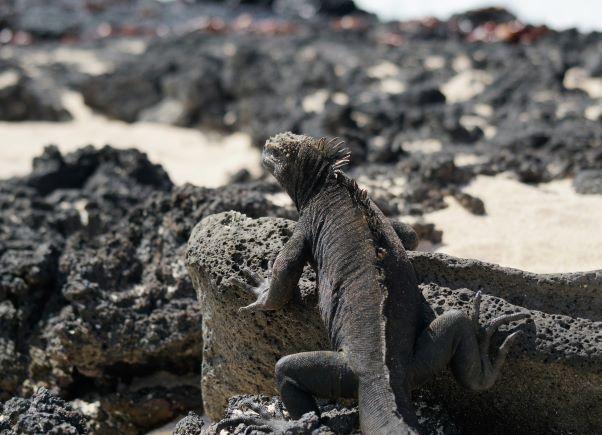
A Galapagos Marine Iguana getting ready to go out to sea. The marine iguana is endemic to the Glapagos.
Snorkel near the Island of Pinzón Island
Honestly, almost every day-trip you take, you have a chance to snorkel. Whether it is to North Seymore when you are seeing blue-footed boobies and frigate birds, or Bartolomé Island for the incredible landscapes, there are always snorkeling opportunities. One of the nice aspects of the Galapagos, every trip provides your mask and fins and even a wet suit if needed. We found the best snorkeling opportunity was Pinzón Island. Though you cannot go onto the island, around it was amazing. We were able to snorkel with sea lions, see scores of schools of fish and sea turtles. Sharks (mostly white-tip and some nursing) and the sea lions were the highlights. And these pristine waters around all the islands is amazing. Underwater photography captures some incredible moments.
Many boats after the snorkeling day will fish for Tuna which is also fun. The cool clear waters around Pinzón Island make it ideal for snorkeling. We also stopped at Santa Fe Island and snorkeled there as well. This was one whole day with a delicious lunch and all the gear provided. There are many choices for a snorkel day, but we think Pinzón Island should be near the top for anyone and with any ability. It was great.
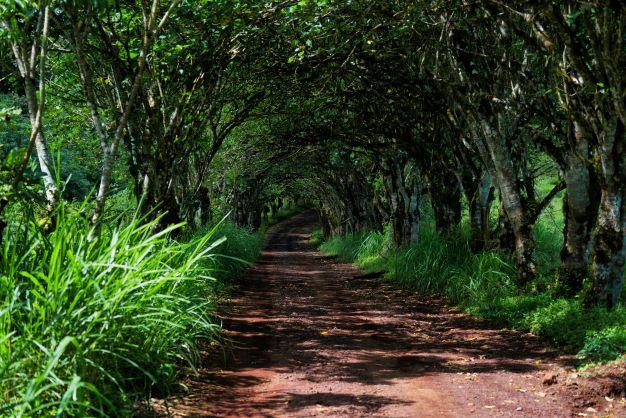
We loved traveling in the Highlands of Santa Cruz. Anticipating seeing the giant tortoises
Head to the highlands and see the Giant Tortoises
Experiencing the giant tortoises at the Darwin Center was great, but to see them in the wild was magnificent. Even before we got there, we saw some wondering along the roadway. By the way, you will need a guide for this. Most tours on the islands which are 97% national park, a guide is required. Our guide Johan was incredible. Born and raised on the Galapagos, the amount of knowledge that he had far surpassed anything we could have gotten from a book. And yes, even large cruise ships need to have local guides and go on the same tours as the day tours. The only difference is that you will sleep in a small cabin compared to having a large house plus the cost.
From Puerto Ayora it takes about 45 minutes to get into the highlands. The guide will pick you up and use their car or taxi to take you there. And once there, you get to see some huge sink holes where the volcanic ground has sunk in and then head to a ranch for a hike and to see the tortoises. This is not like a ranch where they bring the tortoises there so you can see them, the tortoises are not the property of the ranch. They are also free to wander off and go anywhere they like. They are protected and safe.
We saw many tortoises and had a wonderful lunch there. It was a great break to have a day not on a boat and just relax and do a bit of hiking. Don’t miss this as this is a highlight of the Galapagos.
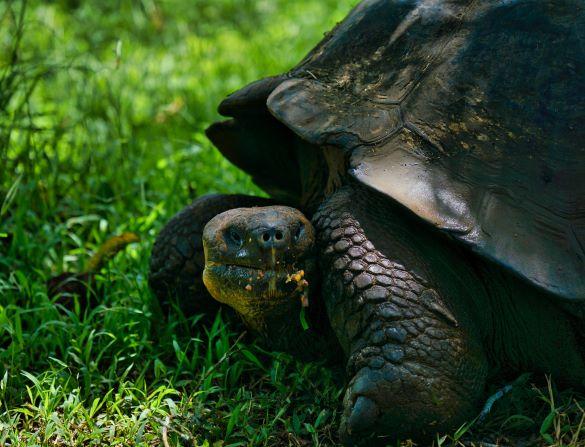
Seeing the giant tortoises in the wild was a highlight of the trip. They have been under threat for a long time, and many conservation efforts are underway to save these magnificent animals.
Explore North Seamore Island and see the Frigate Birds and Blue Footed Boobies
A definite highlight of our exploration was to visit North Seamore Island which is just north of Santa Cruz. This uninhabited island is home to Frigate Birds, Blue Footed Boobies, land iguanas and so much more. After a 45 minute ride to the dock, we boarded a catamarand and headed off. What we got was beyond our expectations. We were two feet, maybe three when a male and female frigate bird performed their mating ritual. They were not bothered by us and it was incredible to see. This is why we came to the Galapagos was to experience nature in its purest form. And this was it.
Coupled with seeing and experiencing the blue-footed boobies and land iguanas and all the other flaura and fauna, North Seamore Island is not to be missed.
Visit Bartolomé and see the incredible scenery and look out for Galapagos Penguins
Our final day trip was to Bartolome Island. This is well known for the iconic scenery as well as Galapagos Penguins that live there. We saw both as well as Sea Lions and snorkeled around the island seeing sharks, schools of fish and rays. It was a wonderful day. But, the most incredible thing that we saw was not actually on the island. The boat trip is 2 1/2 hours from the dock so it takes awhile. On they way there, we saw a Blue Whale. An incredible site that the captain of the boat, after 20 years of driving around the islands had never seen one. For our guide this was his second in his lifetime. Our guide told other guides and again after almost 20 years, they had never seen them as well. We were incredibly lucky and ended up being a highlight in our lives, not just the trip. Head to Bartolome. We cannot promise you will see a Blue Whale but it is an incredible island to explore.
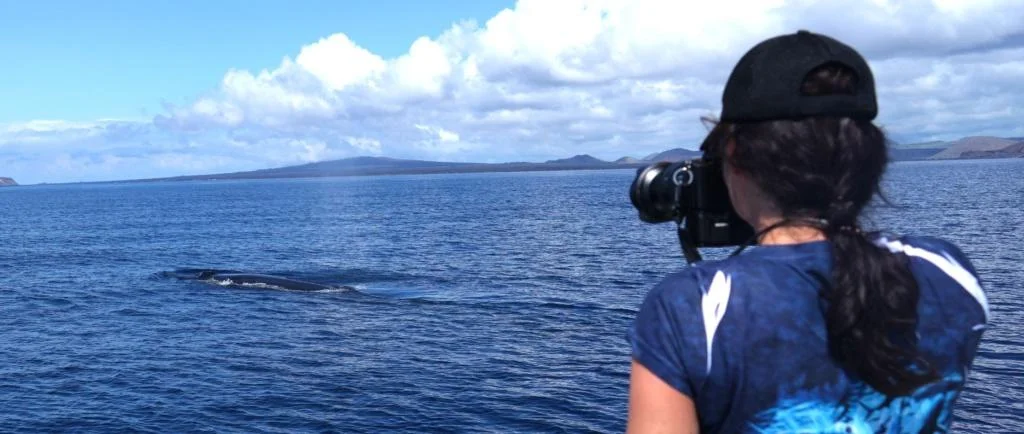
Kati photographing the blue whale. An incredible experience.
Our Final Word
The Galapagos was a dream come true. Pristine waters. Uninhabited beaches. In town, great restaurants including small family-owned ones that serve up great local dishes of fish and ceviche. Kati even ate tiramisu almost every night. Attempts at restricting tourism is difficult, but Ecuador and the Galapagos are doing a good job and the guides that are mandatory to hire are incredible. Our main guide Johan was a Galapagos native and was a valuable resource for us during our trip.
When planning you should decide where you will fly into as you have a choice. We chose Baltra and was not disappointed. But be careful. We were not able to see the Waved Albatross because we were a couple of weeks early, and that trip is better from San Cristobol. So we will return. Also, keep the weather in mind. The Galapagos is a year-round destination, but it can get really humid. There are two seasons, the rainy season and the dry season. We went during the end of the rainy season and it only rained one day, but it was really humid. It was nice to be able to cool off in the water.
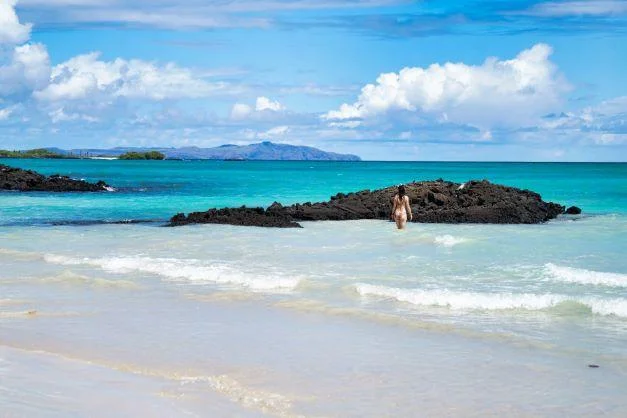
It was hot and humid and Kati welcomed the chance to get into the crystal clear blue waters of the Galapagos.
A special shout out to where we stayed and the owner. The Galapagos Cottages were 4 houses in a square with a pool in the middle. Ours was two floors, with a balcony and they owner was great. She helped us chose the day trips and also just made everything special for us. It was convenient to walk to town, or to the beach and it was a special place to stay. We highly recommend it.
Please remember, the Galapagos is a special place. Humans take second stage to the landscapes and wildlife and every island is different. And they are still evolving. While we were there a volcano was erupting changing the landscape yet again of a nearby island. All of the islands are slowly drifting eastward and will eventually sink and there are native and endemic species of wildlife and plants to experience that are truly unique.
We will definitely go back the Galapagos. They are that special.
4 Comments
Submit a Comment
Related Posts
Preserving Nature’s Legacy: The Vital Role of Wildlife Conservation
In a world where wildlife is facing unprecedented challenges, the importance of conservation efforts has never been more critical, highlighting the urgent need for collective action. Our planet is home to an extraordinary array of species and ecosystems, all of which are interconnected and essential for maintaining ecological balance. From the tireless efforts to protect endangered species from extinction to the pressing necessity of preserving vital habitats that nurture these creatures, the work of dedicated conservationists is foundational to ensuring the survival of our planet’s rich biodiversity.
A Journey Through Nantahala National Forest: Nature’s Wonderland
Nestled in the heart of the Appalachian Mountains in western North Carolina, Nantahala National Forest is a true natural paradise. Spanning over 530,000 acres, this vast forest is a haven for outdoor enthusiasts and nature lovers alike. With its breathtaking scenery, rich biodiversity, and endless recreational opportunities, Nantahala National Forest offers a truly immersive experience in the wonders of the natural world.
Our Top Wildlife Destinations
From majestic lions to playful otters, the wildlife that inhabits our planet never fails to captivate and inspire us. Kati and I have traveled the world to see the incredible wildlife it has to offer from the Arctic to the heart of India. Wildlife never fails to inspire and awe us and has become one of the reasons that we explore new places.

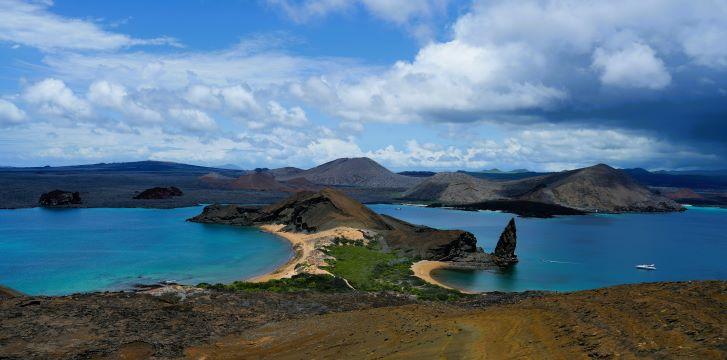
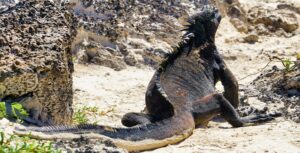

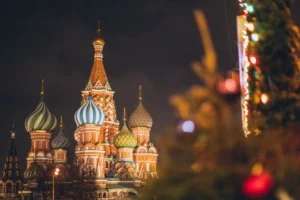
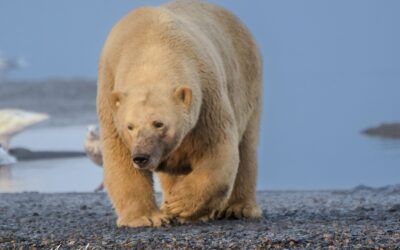
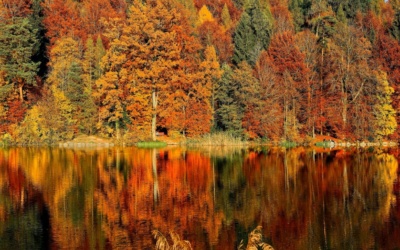
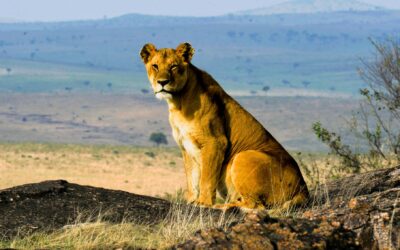



Awesome article.
Thanks.
Hello there I am so delighted I found your webpage, I really found you
by accident, while I was researching on Askjeeve for something else, Nonetheless I am here now and would just like to
say thank you for a incredible post and a all round exciting blog (I also love the theme/design), I don’t have time to
go through it all at the moment but I have saved it and also added your RSS feeds,
so when I have time I will be back to read a great
deal more, Please do keep up the awesome job.
Thanks.